Assassinated Ukrainian language warrior Farion mourned by thousands in Lviv
Thousands of mourners flooded Lviv's streets on July 22 to honor Iryna Farion, the controversial linguist whose assassination has sent shockwaves through Ukraine, highlighting the ongoing struggle for national identity amidst Russian aggression.
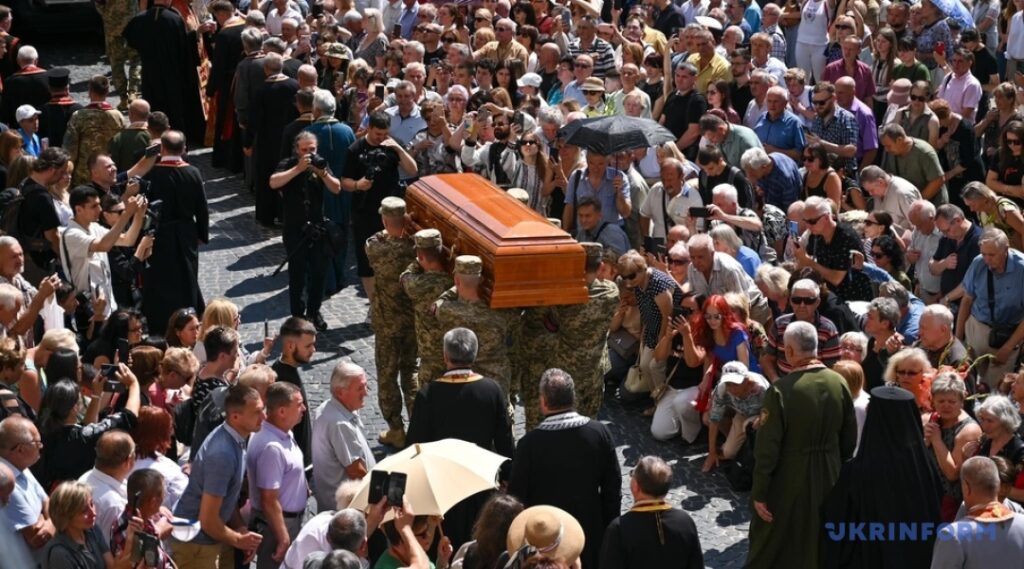

On 22 July, Lviv bid farewell to controversial linguist and public figure Iryna Farion. 60-year-old Farion was shot in the head by an unknown assailant outside of her home in the western city of Lviv. Many believe it was a politically motivated assassination.
As Russia continues its war to eradicate Ukrainian identity and absorb Ukraine back into its sphere of influence, Farion’s murder serves as a symbolic moment. The woman was an outspoken advocate of reviving Ukrainian after centuries of forced Russification — although her blunt statements led some to believe she was a Russian agent.
Iryna Farion was a linguist and former right-wing lawmaker who joined Svoboda, an ultranationalist party, in 2005. She later served in the Ukrainian parliament from 2012 to 2014.
During her career, she was firm in protecting the Ukrainian language, saying, “speaking Ukrainian means dominating.” A polarizing figure, she was extremely critical of Russian-speaking Ukrainians, the families of many of whom were Russified in Soviet times.
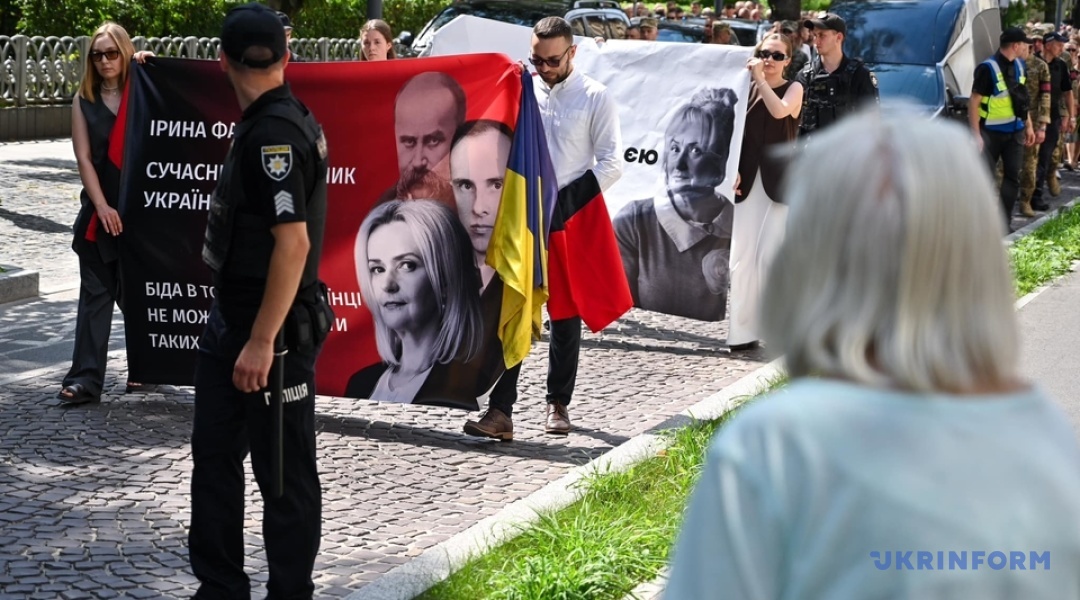
During her work in the Ukrainian parliament, when ousted ex-President Viktor Yanukovych and the pro-Russian Party of Regions were in power, Farion vehemently opposed all attempts at creeping Russification.
Farion also supported a ban on the Ukrainian Orthodox Church (Moscow Patriarchate) activities in Ukraine far before it became mainstream.
“This structure, which calls itself the Moscow Patriarchate, has nothing to do with Christianity. It is one of the greatest threats to the free and self-sufficient development of Ukraine. As long as this institution occupies the Kyiv-Pechersk Lavra, the Ukrainian will remain enslaved,” the professor said in 2008.
Following the 2014 snap elections, when her party did not enter the Verkhovna Rada, Farion returned to Lviv and continued her university career.
After the Russian full-scale invasion of Ukraine in 2022, Farion’s career has been marked by controversy, particularly regarding her views on language. In June 2023, she was reinstated as a professor in the Ukrainian language department at Lviv Polytechnic University, following a previous dismissal due to public outrage over her comments about the Ukrainian language.
In November 2023, she made another statement suggesting that Ukrainian soldiers who speak Russian should not be considered Ukrainian. The situation intensified when Farion allegedly received a supportive message from Maksym Hlebov, a pro-Ukrainian student residing in Russian-occupied Crimea. Farion’s decision to publish the email, including Hlebov’s full name and contact information, on her social media platforms drew severe criticism. Critics argued that this action put Hlebov at risk. Subsequently, Hlebov was reportedly interrogated by Russian occupation authorities in Crimea and compelled to issue an on-camera apology.
Ukraine’s Security Service reported in November 2023 that Farion was under criminal investigation both for her statements about Russian-speaking soldiers and for publicizing the message from Hlebov.
On 15 November 2023, Lviv Polytechnic fired Farion. However, in May 2024, the Lviv Court of Appeal reinstated her in her position. Farion used the money to buy 11 drones for Ukraine’s Armed Forces.
As of 19 July 2024, the pre-trial investigation in the criminal case against Iryna Farion, opened by the SBU in November 2023, was ongoing. In particular, she was charged with insulting the honor and dignity of a serviceman.
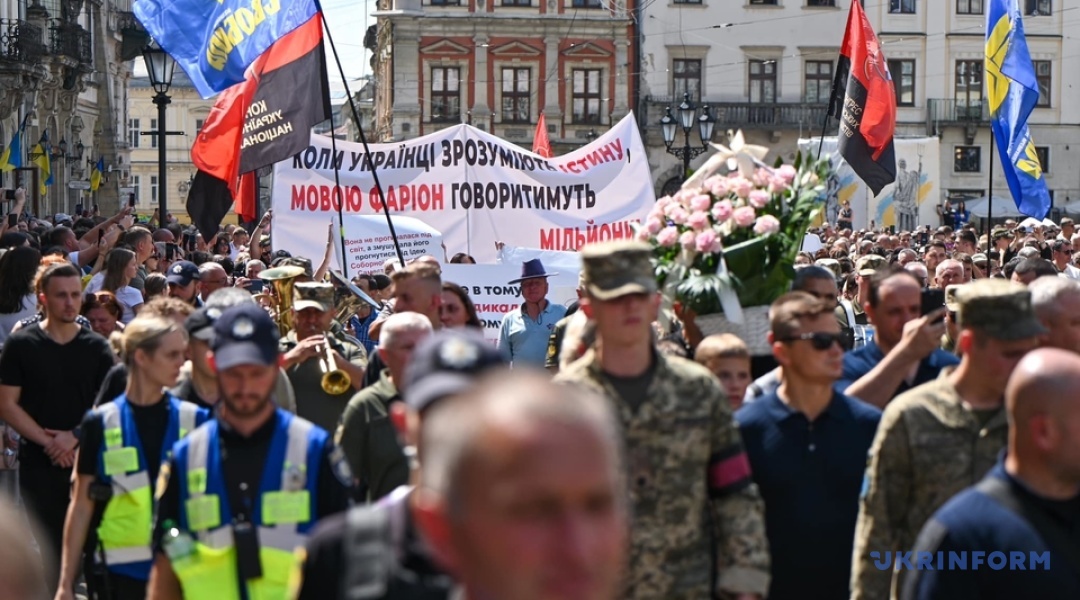
Ukrainians’ opinions of her position and actions varied. Some criticized her for being too radical and said that she “tried to impose a kind of ‘ethnonarcissism’ on Ukrainians, which prevented people from living next to a slightly different identity.”
However, her supporters believe that her provocative statements were justified: had Farion had chosen “dry intellectual, academic language to present her thoughts, millions would not have heard her or have understood the essence of her messages.”
Despite society’s polarized attitude toward her personality, Ukrainians on various social media platforms widely spread the message that no one has ever defended the Ukrainian language as selflessly and passionately as she did.
“A shot at the language” and “The Ukrainian language was killed,” Ukrainians wrote on various social media platforms.
Famous people also shared their shock and dismay at Farion’s assassination. Video blogger and volunteer Serhiy Sternenko, who has himself been targeted in assassination attempts, expressed on social media: “It doesn’t matter how you feel about Farion. (Her murder) is a shameful act of terror that cannot be justified.”
Some Ukrainian officials also commented on her assassination. The head of the Defence Intelligence of Ukraine, Kyrylo Budanov, said, “The enemy [Russians, – ed.] is seeking to use any tools to divide our nation.”
“The cold-blooded murder of a famous linguist is a challenge for the entire Ukrainian society, a crime against the fundamental rights and freedoms of Ukrainians,” he wrote on Telegram.
According to him, Iryna Farion “died for the Ukrainian position.”
“We have no right to tolerate such crimes and will continue to defend Ukraine both at the front and inside our country,” Budanov added.
The funeral service for Iryna Farion began at 2 pm on 22 July at the Garrison Church of Saints Peter and Paul. An hour before the service, thousands of people started gathering near the church.
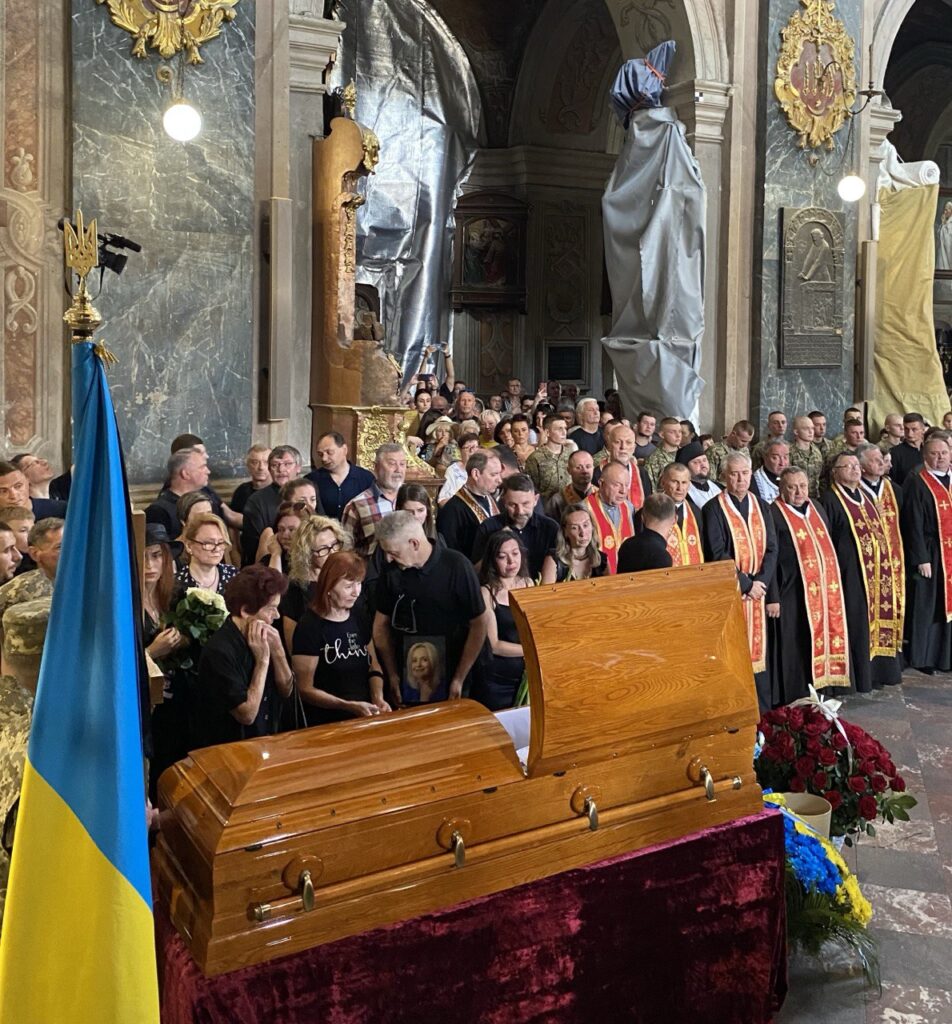
Relatives, colleagues, soldiers, party members, and Lviv residents came to pay their respects to the professor.
“This is a great loss for Ukraine. Ukraine should have its Ukrainian language, Ukrainian identity, and Ukrainian church. Ms. Iryna fought for this until the end, but unfortunately, the enemy ended her life with a cynical shot,” Ruslan Martsinkiv, Iryna Farion’s party colleague from the Svoboda party, said.
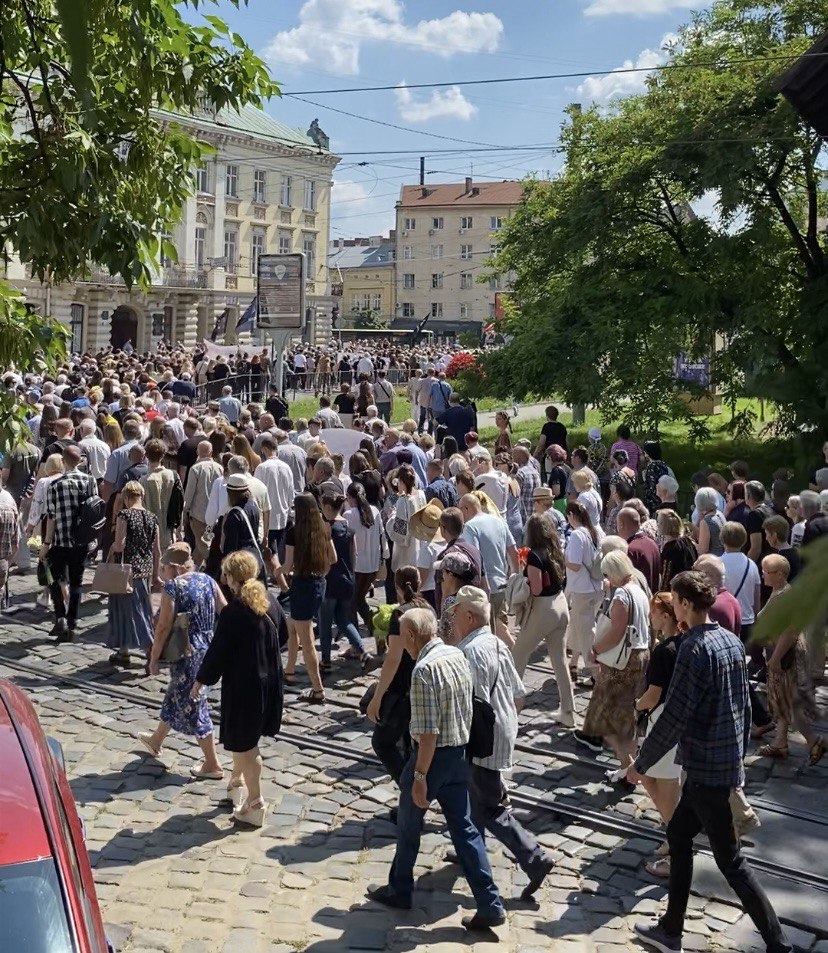
After the funeral service, around 3 pm, the procession moved to Lychakiv Cemetery. People chanted the slogan: “One language, one nation, one homeland—this is Ukraine.”
The Farion’s daughter, Sofia Semchyshyn, thanked the doctors and all those who came to mourn her mother and expressed condolences.
“Our family is sincerely grateful to the doctors who fought for 40 minutes for your life, Mom, but God decided to take you. Why? A question without an answer…To all Ukrainians who share this pain of loss with us, we are grateful and bow our heads to you. Know, Mom, that as long as the memory of you is in our hearts and our thoughts, you will live forever,” said Sofia Semchyshyn.
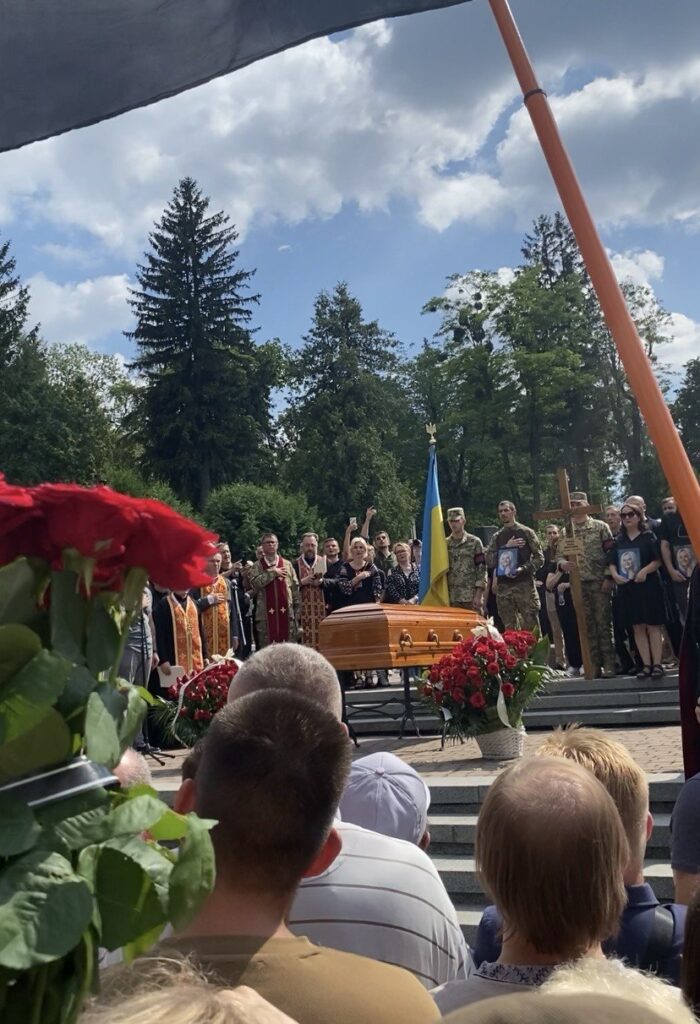
Iryna Farion was buried in the central alley of the cemetery – field No. 22, near the grave of composer, poet, and singer Volodymyr Ivasiuk, who was also buried on 22 July 1979, 45 years ago. The composer was killed for his pro-Ukrainian position. On 24 April, he received a phone call and left home, never to return alive. On 18 May, the artist’s hanged body was found in a forest near Lviv, on the territory of a military unit.
The investigation of the assassination
On 19 July, around 7:30 pm, an unknown person shot Farion near her home and then fled. After being hospitalized and undergoing surgery, Natalia Matolinets, head of the anesthesiology service of the First Territorial Medical Association of Lviv, said that her condition was critical: a deep cerebral coma. At 11:30 pm, she reportedly died.
Right after the assassination, Lviv announced a special police operation to detain the shooter.
The attack on Iryna Farion was classified under Part 1 of Article 115 (Premeditated Murder) of the Criminal Code of Ukraine. The shooter faces up to fifteen years in prison.
The investigation is considering several motives for the murder, including public/political activity and personal animosity. President Volodymyr Zelenskyy said on 20 July that all possible leads are being investigated and that Russian involvement has not been ruled out.
Interior Minister Ihor Klymenko said that some security cameras near the crime scene were turned off due to scheduled power outages, complicating the police investigation.
A resident of the apartment building on Masaryk Street in Lviv, where Farion lived, said that about two weeks ago, an unknown young man of around 18 years old was near the entrance. In the morning, he would sit on a bench opposite the professor’s entrance and leave only in the evening.
Ihor Klymenko confirmed that the stranger in the photo is the main suspect. The police are now conducting a search operation to detain him.
According to Klymenko, the main versions are that Farion was murdered due to her public and political activity or due to personal hatred.
Sources in law enforcement agencies said to Suspilne on 22 July that Farion’s murder had been prepared for at least a month. Investigators believe that the murder was a contract killing.
Read also:
- Kyiv Arsenal Book Fair 2024 draws 35,000 visitors despite war. PHOTO REPORT
- Defense Ministry: Women increasingly enlisting in Ukrainian forces
- Can Ukraine cancel Russia’s imperial history? Odesa debates decolonization
You could close this page. Or you could join our community and help us produce more materials like this.
We keep our reporting open and accessible to everyone because we believe in the power of free information. This is why our small, cost-effective team depends on the support of readers like you to bring deliver timely news, quality analysis, and on-the-ground reports about Russia's war against Ukraine and Ukraine's struggle to build a democratic society.
A little bit goes a long way: for as little as the cost of one cup of coffee a month, you can help build bridges between Ukraine and the rest of the world, plus become a co-creator and vote for topics we should cover next. Become a patron or see other ways to support.


